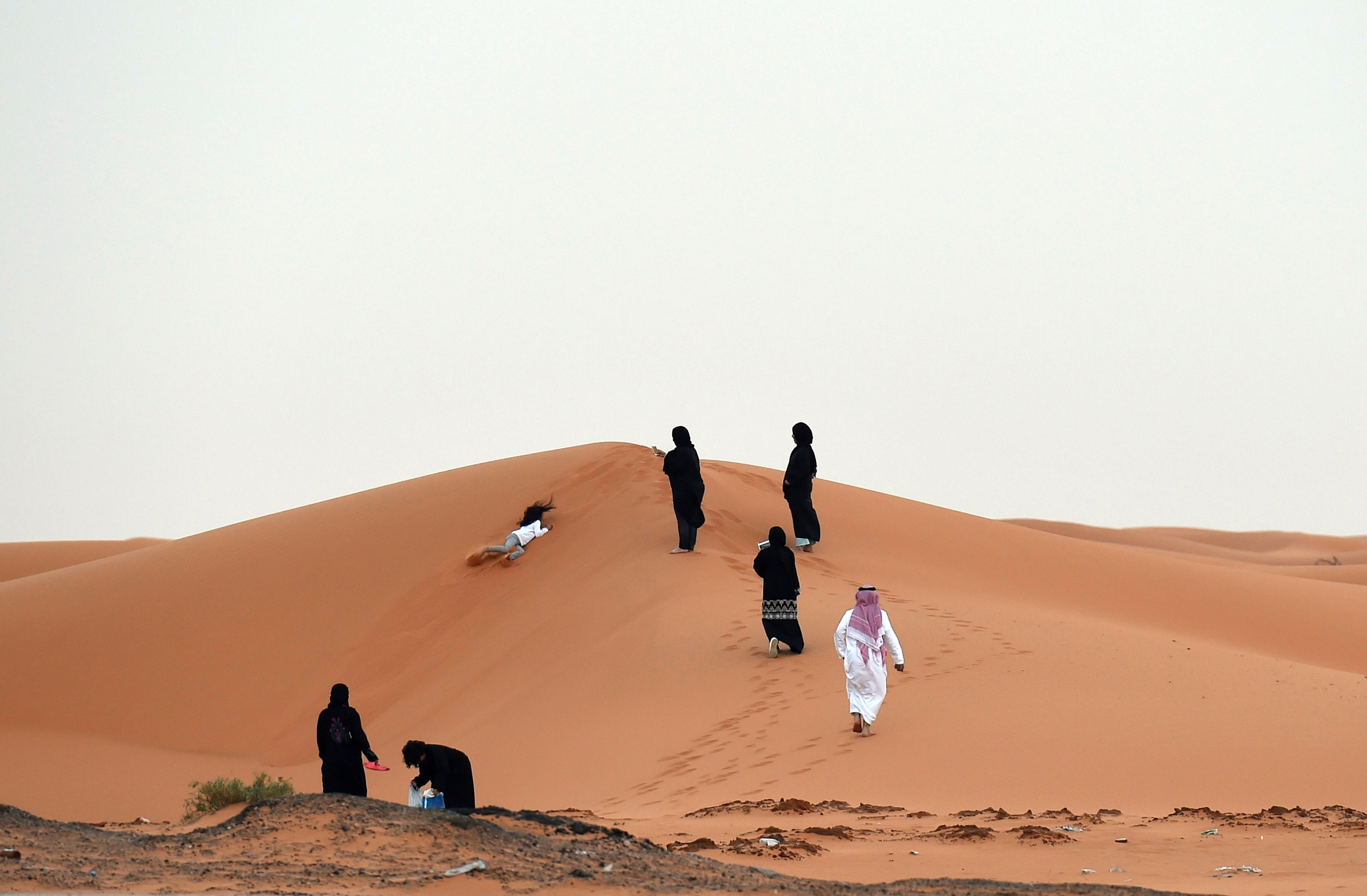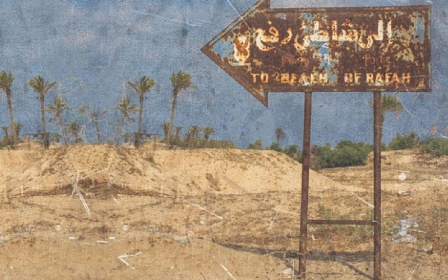BOOK REVIEW: How lineage as much as oil and faith formed modern Saudi Arabia

Saudi Arabia's social structure is a rarely discussed component in the country's oil age history.
Though the kingdom's image has taken on a relatively simplistic dimension in international relations over the years - notably through alliances between kings and US presidents and King Faisal's famous oil embargo of 1973 - its sociological history is a vital component when understanding the country at large.
Nadav Samin’s Of Sand or Soil is the first comprehensive look at the demographic markers that shaped identity in central Arabia in and around the 1970s oil boom, now feared to be in decline.
In a region that saw a mass influx of pilgrims over the centuries to Makkah, the Prophet Mohammed’s birth place, and Madinah, his final resting place, many families from the Far East, Turkey, Central Asia and Africa would settle predominantly in the Hijaz region - home to both the holy sites - and become assimilated into what became the modern Saudi state.
By contrast, the rural and central Najd region, from where the country's ruling family originates, was home to some of the country's oldest tribes. Non-Arab pilgrims also migrated to Najd, while the descendants of slaves and fugitives who had lost their lineage also lived among the peninsula's oldest tribes.
New MEE newsletter: Jerusalem Dispatch
Sign up to get the latest insights and analysis on Israel-Palestine, alongside Turkey Unpacked and other MEE newsletters
Though the kingdom's ethnic melting pot became typical of the country's national demographics, and more or less accepted by Arabs since assimilation spanned several centuries (not to mention the fact that many of the prophet’s revered companions were non-Arab) it would eventually amplify the fascination with lineage.
Samin is perhaps the only academic who has delivered an extensive critique on the work of one of the country's most prolific scholars, Hamad al-Jasir, formerly a journalist who, beginning around the 1970s, embarked on a genealogical project after being beckoned by hundreds of petitioners – many of whom were non-tribal and lower in status on a state level – to ascertain a concrete lineage.
Samin takes a biographical approach to Al-Jasir’s work, using his studies to document the period in which genealogy went from being ascribed to prominent families – passed on orally from generation to generation via tribal elders – to an area of intense and universal interest after the Second World War when both Bedouin and non-nomadic Saudis were assimilated into a then nascent state.
Tribal belonging seemed the only way to set them apart and assert some sort of claim to territory, which paved the way for what Samin, a professor of anthropology at Dartmouth College, New Hampshire, refers to as a genealogical culture.
As Samin puts it, "the Saudi conquerors had inherited a population with two broadly distinct sociological profiles: one town-based, commerce-oriented and ethnically diverse; the other rural, pastoralist and tribal".
Samin, who travelled extensively within both regions, "decided that it was most compelling to approach the study of Saudi history and culture through an emphasis on kinship, oral tradition, and social transformation, elements that are less tangible than the religious and economic narratives, yet no less vital for understanding the nature of modern life in the kingdom".
He followed several case studies of avid and eager Saudi lineage seekers as they provide Al-Jasir with personal narratives and anecdotes into their journey of self-discovery. Most notable were the dialogues of these citizens in the domains of marriage and kinship. As one scholar he quotes puts it, “the marital relationship of an individual was decisively determined by his tribal affiliation”.
While the book draws heavily on archival sources, “the interpersonal dimensions of the research were absolutely essential for discerning the significance of genealogical discourse, and understanding why it all matters so much to so many people”.
“I combined archival research, principally in the private library of Hamad A- Jasir, with interviews and ethnographic description of contemporary Saudi communities, both in Riyadh and Al-Ula,” explains Samin.
In a still deeply reserved society, discussion of the absence of tribal genealogies is, in many regions, considered taboo. This was dominant to the point where, as Samin points out, Al-Jasir would feign ignorance if he doubted or knew for a fact that the person inquiring is from a non-tribal family.
“He would never say that it is a non-tribal family,” according to Al-Jasir’s daughter.
Samin discusses the racial dimension in this period of tremendous material change, when the 1973 Israeli-Arab war led to an embargo that would cause an unprecedented surge in wealth.
During this period in particular, Bedouin awareness of bloodlines compared with the "settler Saudis" they mingled with at school was heightened. This, he says, prompted non-tribal, sedentary children to develop a thirst for trying to ascribe origins to their family names, while at the same time lineage stirred a sense of exclusivist nationalism among the peninsula's indigenous people.
The assimilation of sedentary peoples was, initially at least, superficial. This naturalisation of foreigners did not stop Bedouin populations in the region from collecting tax from their settlers before the political landscape changed, much in the same way that the Islamic empire did with non-Muslim inhabitants of its territories.
When it comes to explaining economic drivers, Samin points out that the country’s sudden wealth and the erosion of kinship ties through the assertion of the preeminence of religion did not stop lineage becoming the main binding mechanism of the political hierarchy. Samin calls this the genealogical rule of governance.
While some families enriched themselves through claims to kinship of "superior" blood – some historically rooted, others invented – some families solidified a sense of belonging to old hierarchies regardless of whether such an affiliation would yield them any wealth.
Many changed tribes for economic reasons and cousins often claimed different ancestries, whether for more money or to reassert supremacy. And it didn't stop there. American and British experts even used lineage as a legal tool in their assertion to territorial claims on behalf of their Gulf sovereign clients.
Mediation with tribes was channelled through town leaders well into the 20th century and deeper studies into demographics – through Al-Jasir himself for a while – were sought to get to know how to deal with the different tribes and groups.
“The interesting thing that happens when you study Arabian genealogies from a social perspective is that you are able to construct a narrative about identity formation and social organisation from the bottom up, through the stories and experiences of hundreds of different individuals,” he says.
Samin alludes to how renowned Al-Jasir was during his lifetime, particularly as a columnist in Saudi newspapers, having published several thousand articles and several dozen books.
“The measure of his legacy is not fully apparent until one examines the thousands of letters preserved in his private library,” says Samin.
“It was only among those papers that I realised the importance of Al-Jasir, not only for the development of a historiographical tradition in modern Saudi Arabia, but also for, in a sense, helping engineer ideas about kinship, genealogy, and the emergent shape of Saudi social life.”
One of Samin’s strongest concluding points was to remind readers that the simplistic view that oil wealth and religiosity form the basis of the modern Saudi state is flawed and that both these factors are still underpinned by a very strong lineal narrative thanks to the glorification of lineage at a government level.
Paradoxically, the Wahhabi literalist strand of religion espoused by the ruling family at the time of the foundation of modern-day Saudi Arabia diluted tribalism by encouraging literacy and conformity to impersonal, scriptural norms, but this was still not enough to subdue the lineal narrative, if not for its strength in national identity, then its central role in political manoeuvring.
As Samin points out, the state “grafted itself onto the pre-existing social structures of town and nomadic life”.
Bedouins were often exempt from having to carry around forms of identification. Though prominent tribal household names form much of the working class and National Guard, Samin asserts that “Gulf oil monarchies depend on alignment with their Bedouin populations”.
All this points to the author’s main premise: that lineal authority cannot be understated, indeed, is a pivotal marker, when understanding the political and demographic dimensions of today's Saudi nation.
"Of Sand or Soil: Genealogy and Tribal Belonging in Saudi Arabia" by Nadav Samin (2015, Princeton University Press).
Middle East Eye delivers independent and unrivalled coverage and analysis of the Middle East, North Africa and beyond. To learn more about republishing this content and the associated fees, please fill out this form. More about MEE can be found here.




